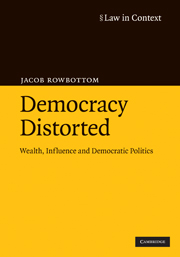Book contents
- Frontmatter
- Contents
- Preface and acknowledgements
- 1 Political equality, wealth and democracy
- 2 Freedom to speak and freedom to spend
- 3 Strategies and reforms
- 4 Access, influence and lobbying
- 5 Beyond equal votes: election campaigns and political parties
- 6 Public spaces, property and participation
- 7 The mass media: democratic dreams and private propagandists
- 8 Participation in the digital era: a new distribution?
- 9 Conclusion
- Index
- References
7 - The mass media: democratic dreams and private propagandists
Published online by Cambridge University Press: 05 June 2012
- Frontmatter
- Contents
- Preface and acknowledgements
- 1 Political equality, wealth and democracy
- 2 Freedom to speak and freedom to spend
- 3 Strategies and reforms
- 4 Access, influence and lobbying
- 5 Beyond equal votes: election campaigns and political parties
- 6 Public spaces, property and participation
- 7 The mass media: democratic dreams and private propagandists
- 8 Participation in the digital era: a new distribution?
- 9 Conclusion
- Index
- References
Summary
The mass media play an essential role in a democracy. The virtues of a free press have long been stressed as a way of holding the government to account and maintaining an active and informed citizenry. Yet a tension exists between the mass media and equality. It is not possible for every individual or group to have equal resources to speak to a mass audience. The mass media implies a level of inequality in which a few people communicate with many. The inequality is unproblematic if an idealised account of the media is taken, in which newspapers and broadcasters merely serve the needs of citizens and amplify their concerns. However, in practice, the idealistic accounts of the media often give way to a more sceptical view, that far from empowering citizens, the media exerts political power on behalf of its owners, staff or advertisers.
Concerns about the power of the media are not new. In 1931 Prime Minister Stanley Baldwin famously complained that newspaper owners exercise ‘power without responsibility’. The view of the media as wielding political power does not just come from disgruntled politicians. The media sometimes encourages such a view, boasting of its ability to determine an election outcome. The concern may not be novel, yet the power of the media is seen to be in the ascendancy, playing a more central role in public life.
- Type
- Chapter
- Information
- Democracy DistortedWealth, Influence and Democratic Politics, pp. 171 - 215Publisher: Cambridge University PressPrint publication year: 2010

